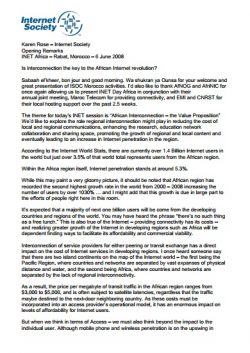Karen Rose – Internet Society
Opening Remarks
INET Africa – Rabat, Morocco – 6 June 2008
Sabaah el’kheer, bon jour and good morning. Wa shukran ya Ounsa for your welcome and great presentation of ISOC Morocco activities. I’d also like to thank AfNOG and AfriNIC for once again allowing us to present INET Day Africa in conjunction with their
annual joint meeting, Maroc Telecom for providing connectivity, and EMI and CNRST for their local hosting support over the past 2.5 weeks.
The theme for today’s INET session is “African Interconnection – the Value Proposition”
We’d like to explore the role regional interconnection might play in reducing the cost of
local and regional communications, enhancing the research, education network collaboration and sharing space, promoting the growth of regional and local content and
eventually leading to an increase in Internet penetration in the region.
According to the Internet World Stats, there are currently over 1.4 Billion Internet users in the world but just over 3.5% of that world total represents users from the African region.
Within the Africa region itself, Internet penetration stands at around 5.3%.
While this may paint a very gloomy picture, it should be noted that African region has recorded the second highest growth rate in the world from 2000 – 2008 increasing the number of users by over 1030% … and I might add that this growth is due in large part to the efforts of people right here in this room.
It’s expected that a majority of next one billion users will be come from the developing countries and regions of the world. You may have heard the phrase “there’s no such thing as a free lunch.” This is also true of the Internet – providing connectivity has its costs — and realizing greater growth of the Internet in developing regions such as Africa will be dependent finding ways to facilitate its affordability and commercial viability.
Interconnection of service providers for either peering or transit exchange has a direct impact on the cost of Internet services in developing regions. I once heard someone say that there are two island continents on the map of the Internet world – the first being the Pacific Region, where countries and networks are separated by vast expanses of physical distance and water, and the second being Africa, where countries and networks are separated by the lack of regional interconnectivity.
As a result, the price per megabyte of transit traffic in the African region ranges from
$3,000 to $5,000, and is often subject to satellite latencies, regardless that the traffic maybe destined to the next-door neighboring country. As these costs must be incorporated into an access provider’s operational model, it has an enormous impact on levels of affordability for Internet users.
But when we think in terms of Access – we must also think beyond the impact to the individual user. Although mobile phone and wireless penetration is on the upswing in Africa, this won’t meet all the needs of high bandwidth consumers such as education, enterprise and government.
Affordable regional and international connectivity is vital to the growth and sustainability of university Research and Education Networks, whose mission to serve scientific and academic research in Africa is crucial to the social, scientific, and economic advancement of the continent. Often working in budget constrained environments, transit costs can directly impact the ability of university to foster collaboration and compute intensive applications, such as mass data transfer and grid computing.
Further, as Africa seeks to become a more integrated continent in terms of regional trade, this will increase the cross-border demand for both voice and data communications.
However, the lack of direct interconnections between the various trading blocks results in high communication costs to entities — including Internet and telecommunications companies — wishing to contribute to organic economic growth in Africa.
And the trans-Mediterranean undersea cable incidents that happened earlier this year underscore the problems that can occur when there is limited redundancy in national network architectures.
So what role could increased interconnectivity on the continent play in helping Africa to achieve its digital, economic, social and scientific aspirations?
We are pleased to have with us to day representatives from many stakeholder groups with an active interest in this area, including telecommunications, Internet service and content providers, IXPs, the University NREN community, government, and international experts, among others.
Let me give you an overview of today’s agenda:
We will start this morning with an overview of African Infrastructure Assets – What’s in the ground, who is connected, and what’s out there.
After the coffee break, we will have a session on Internet Connection Challenges in Africa, followed by a session on Transit and Peering.
We’ll pause between 1:15 and 3:15 for lunch and Friday afternoon prayers.
In the afternoon we’ll have a discussion on interconnection experiences in Africa, and a presentation on the business case for interconnection.
After afternoon tea we will have a session on establishing interconnection points from the NREN perspective. And finally we will have an open Q and A session.
It’s our hope that you will contribute actively to the discussions today. At the end of the day session it would be ideal if we can work towards identifying the value proposition of interconnection for Africa.
Lastly as the day progresses, I wish to request that at the back of your mind think through this question: Is interconnection the key to an African Internet revolution and if so, what can we collectively do to achieve it?
